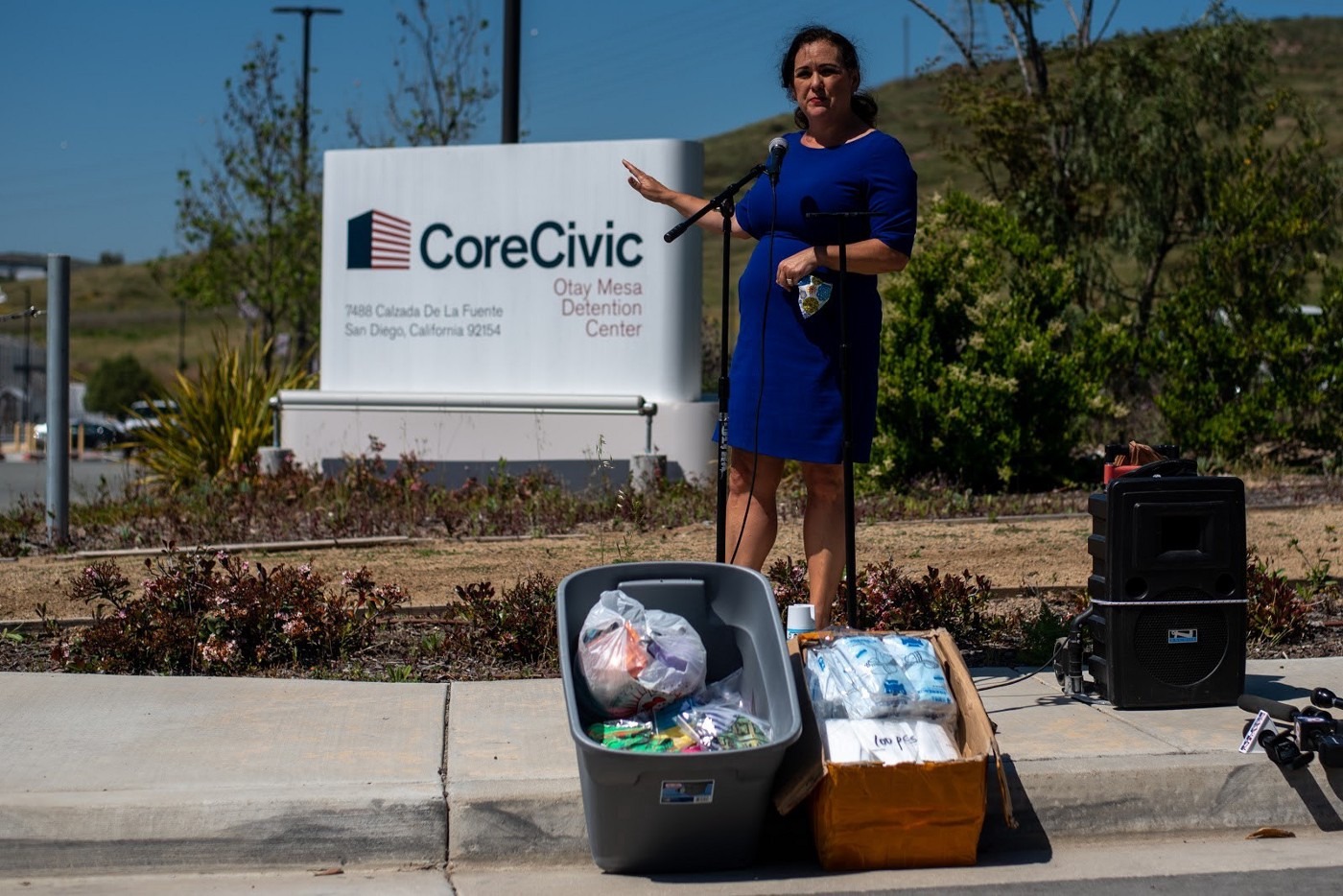Medically vulnerable migrants plea for release from detention

California Assemblymember Lorena Gonzalez attempted to deliver 1,000 masks to detainees at Otay Mesa Detention Center on Friday April 24. Security guards hired by CoreCivic, the private corporation that runs Otay Mesa, turned away her donation. (David Rodriguez).
April 30, 2020
When Ernesto Salazar arrived at the US-Mexico border, he felt a feeling he hadn’t felt in a while: hope. He finally could live openly as a gay man with his partner. He says he was sexually assaulted by gang members in his home country of El Salvador for being gay and later diagnosed as HIV positive. Two years ago, he and his partner fled to the United States, and after several grueling months, they arrived in Tijuana, Mexico.
They had to sufficiently demonstrate that their lives were at risk in Mexico under the Migrant Protections Protocol program, commonly known as “Remain in Mexico.” They became, according to TRAC Reports from Syracuse University, part of less than one percent of migrants to do so, and authorities allowed them into the US. But rather than reuniting with their sponsor in New Mexico, they were taken to a detention center in San Diego, where they now fear for their lives.
That detention center now has the worst COVID-19 outbreak amongst Immigration and Customs Enforcement facilities in the country — over 150 cases, including US Marshal detainees in the same facility.
“My nerves are so rattled right now,” Mr. Salazar said in Spanish. “You have to look out for yourself here.”
Mr. Salazar, who’s name we are withholding for his protection, is one of many medically vulnerable people inside Otay Mesa, according to phone calls with nine people detained there, reviews of over 20 letters received by Allies to End Detention, an immigrant advocacy group, and a class action lawsuit filed by the ACLU of San Diego and Imperial Counties.
“We are all panicking here,” a 28 year old man from El Salvador, who has asthma and epilepsy, said over the phone in Spanish. “It’s an invisible enemy. I don’t know when I’m going to inhale it.”
The risk of many detainees getting sick in ICE detention centers has been called a “tinderbox scenario” in a letter to Congress by Scott Allen, a physician who investigates ICE facilities for the Department of Homeland Security.
On April 22nd, Monika Langarica, an attorney with ACLU of San Diego and Imperial Counties, filed a class action lawsuit seeking the release of all Otay Mesa detainees with underlying medical conditions as well as those over the age of 44.
“The match,” Ms. Langarica said, “has been lit.”
Once detained inside Otay Mesa, Mr. Salazar was separated from his partner. He is currently in a pod along with over 100 other people, where at least eight detainees have been removed for having a fever, he said. Detainees who show COVID-19 symptoms are put into medical isolation, according to Kelly Beckhelm, ICE Assistant Officer in Charge at Otay Mesa, in a legal filing.
He and other detainees have expressed concern that they have little protection against the coronavirus.
Court filings show that officials at Otay Mesa first passed out paper masks to detainees on April 10th.
In an audio recording from that same day, provided by Pueblo Sin Fronteras, women in Otay Mesa could be heard screaming that they were being pepper sprayed. “They do not respect us! We are humans, not animals! Help!” a woman can be heard saying in Spanish. According to the women, they were being forced to sign a contract that would absolve CoreCivic from being held liable if they were to contract COVID-19 in exchange for masks. When they refused to sign, they alleged, “They are spraying pepper spray in all the cells.”
ICE and CoreCivic deny any use of chemical agents on April 10th, and said that since then, “no signed waivers are required.” CoreCivic, in a statement, further stated that “we are committed to ensuring the health and safety of those in our care, our employees and our community.”
Mr. Salazar said his mask became torn and dirty after over ten days of use. He did not receive a second mask until April 24th, three days after the class action lawsuit was filed and the same day Assemblymember Lorena Gonzalez of San Diego held a press conference outside of the detention facility. She, along with immigrants rights advocates, attempted to deliver 1,000 masks — half of which were fabric — to Otay Mesa detainees but were turned away by private security guards.
Since the pandemic started, the kitchen has shut down in order to limit staff and detainee interaction, and staff are serving detainees boxed meals, according to documents filed by Warden Christopher LaRose. Four people detained in separate pods said over the phone that while they used to be served full meals before, they are now only being served bread and ham for breakfast, lunch, and dinner. Occasionally, they will also receive a hot dog. Mr. Salazar says the lack of nutrition in the meals makes him nauseous and drowsy. “If we don’t die of coronavirus, we are going to die from hunger,” he said. “My body doesn’t have the necessary defenses.”
People inside Otay Mesa also say that there is inadequate soap. “You know those little sample soaps that they give you when you go to a motel?” a man from Mexico asked. “You know the little soaps they leave on your pillow? That’s what they give you here.” Another man said he gets a travel size soap every Tuesday, but has to buy extra supplies from the commissary. Warden LaRose, in a legal filing, wrote that every detainee receives two bars of soap per week.
Some detainees are taking more extreme measures to change their conditions. At least three people said over the phone they went on hunger strike for at least ten days, and said others picked up the hunger strikes when they stopped. “I feel like how my ancestors felt when they decided that death was better than slavery,” Anthony, a Haitian man with a history of asthma, said. ICE has confirmed there were at least four people on hunger strike as of April 28th.
Meanwhile, Mr. Salazar is anxiously waiting for a hearing to be released on parole. All immigration proceedings at Otay Mesa have stopped because of the pandemic, but video hearings are currently held in another San Diego immigration court.
“All I ask is that they give me a chance to fight my case outside of here,” he said. “I feel very vulnerable right now.”
Jess Alvarenga is a documentary filmmaker and investigative reporter. She is a graduate student at UC Berkeley Graduate School of Journalism. Twitter: @jessalvarenga_
Lucas Guilkey contributed reporting.



